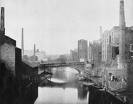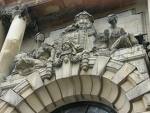
William Harris Cox (11 December 1816 – 16 April 1875) was an English orthodox physician who converted to homeopathy and who practiced in Rochdale and later Manchester.
Cox studied homeopathy under Edward Christopher Holland and worked as Holland’s medical assistant on two occasions, first in Honiton, Devon, and from 1854, in Rochdale.
Cox was also a friend and colleague of Edward Phillips. When Phillips left Manchester for London in 1863, he invited Cox to succeed him in his large practice.
William Harris Cox was born in Honiton, Devon, the son of county coroner Isaac Cox (1785 – 1831) and Elizabeth Murch (1782 – 1866).
He married Emily Susannah Woodgates (1826 – 1888). They had six children: Lucy Elizabeth Cox (1856 – ), Richard Percy Cox (1858 – ), Emily Matilda Cox (1859 – ), Mary C. Cox (1862 – ), William A. S. Cox (1864 – ), Edith Cox (1865 – )
In 1869, Harris Cox was one of the Honorary Medical Officers at the Manchester Homeopathic Hospital and Dispensary where his colleagues included Charles Harrison Blackley, John Drummond, Francis Blake Hutchinson, Thomas Lowther Mathews, John Bower Morehouse, Thomas Rayner, surgeon John Maffey, and Dispenser W. B. Horner.
William Harris Cox was elected as Vice-President of the 1875 British Homoeopathic Congress, held at the Palatine Hotel in Manchester in September, but died just four months before the meeting convened.
Deeply do we regret to announce the sudden removal from amongst us of that true-hearted friend, genial companion, and excellent practitioner of our art, William Cox, of Manchester. Actively engaged in the duties of his profession on the 12th, he was buried at Rochdale on the 20th of last month. He was at Rochdale on the evening of the 12th, and when waiting at the station experienced a severe chill. Arriving in Manchester he went to see a patient residing at Cheetham Hill; his last visit paid, a further drive of fully three miles was necessary before he could reach his house. When he arrived he was so ill that it was with difficulty he was removed from his carriage, and conveyed to bed. High fever rapidly developed, the pulse rose to 140, and the temperature to 105%. On further examination it was found that both lungs were engorged throughout their entire extent. On the night of the 14th pleurisy of the right side set in, and the pain it occasioned was severe. The countenance became livid, dyspnoea intense, and there was at the same time a short hacking, but powerless cough. From the first onset his recovery appeared hopeless, the general prostration rapidly increased, and retaining his consciousness to the last he died early on the morning of the 16th, in the 59th year of his age.
Mr. Cox was the son of Mr. Isaac Cox, of Honiton, one of the coroners for the county of Devon. About the year 1832 he was apprenticed to Mr. Davis, a surgeon in extensive colliery practice at Merthyr-Tydvil, in South Wales. During the five years passed in Mr. Davis’s surgery Cox saw a large amount of surgical and general practice, and doubtless acquired that prompti-tude in action and fertility in resource which characterised him throughout his professional career. His education was completed at University College Hospital. He had lodged his schedule of certificates at the College of Surgeons, and was on the eve of going up for examination when he was suddenly summoned to Exeter to take charge of the practice of a relative who had died. He went, and there remained for more than a year.
Absence from the hospitals disinclined him to present himself for examination when he was relieved of his duties in Exeter, and he returned to Honiton and acted as an assistant to Mr. Devenish, a surgeon to one of the Poor-Law districts of the Honiton Union. Both Mr. Cox and his principal made themselves conspicuous by their hostility to homœopathy. In 1849 cholera made a second and very fatal visitation to Honiton. It was especially so in Mr. Devenish’s district – every case that occurred, we have heard, terminated fatally. So great was the mortality in this district, that Mr. Devenish was remonstrated with for not calling in the assistance of some of the other medical men of the town. This he fruitlessly endeavoured to do, until finally he and his assistant called on Dr. Holland, and begged him – with many apologies for the offensive expressions they had so profusely used towards him – to help them. He did so. Homeopathic treatment was substituted for that they had previously relied upon, and both Mr. Devenish and Mr. Cox were thoroughly astounded at the result. With one exception, every case of genuine cholera recovered; besides a great many cases of cholerine, most of which would, but for the treatment, have passed into true cholera.From that time Mr. Cox devoted himself to the study and practice of homoeopathy, acting as assistant to Dr. Holland until he left for Rochdale in 1852. Soon afterwards he went as an assistant to the late Dr. Ramsbotham, then practising at Huddersfield. With him he remained until 1854, when he again went in the same capacity to Dr. Holland at Rochdale.
He had ever felt the lack of a qualification, and repeated endeavours to recover the schedule he had deposited at the College of Surgeons had failed. Finally, however, it was discovered, and Cox at once went to London to prepare himself for examination. An unforeseen difficulty now presented itself. The envy, hatred, and malice which the fact of Mr. Cox’s practising homoeopathically had excited in the minds of the medical men of Rochdale prompted them to memorialise the College not to admit him to examination. Fortunately, the late Sir William – then Mr. – Lawrence was the President for the year. He was too sharp-sighted a man not to see the animus pervading the libellous document that had been presented, too just to act upon the ex parte statements of jealous rivals, and too honourable not to give Mr. Cox an opportunity of clearing himself of the infamous charges which the fact of his practising homoeopathically had incited his professional neighbours to invent for the purpose of ensuring his professional ruin. Full enquiries were made by Sir William Lawrence, which terminated in completely exonerating Mr. Cox from the imputations that had been brought against his character. He was at once duly admitted, and passed an excellent examination in 1856.
He shortly afterwards succeeded Dr. Holland on his removal to Norwich. In Rochdale he had a large and lucrative practice, and there remained until the late Dr. Edward Phillips induced him to remove to Manchester. There he has since remained, and his ability as a practitioner, his kindness and devotion to his patients, the skill and care with which he ministered to their relief, procured for him a high reputation among an unusually extensive circle of friends.
At the Congress held last year, Mr. Cox was elected Vice-President of that which is to take place in Manchester in September. There his presence will, we are sure, be greatly missed.
Of his private worth as a friend, of his generosity in aiding or defending the interests of any who he was convinced were subjects of injustice or ingratitude, it is impossible to speak too strongly.
Few men have lived to be more thoroughly or more justly esteemed than Cox was; few have died who have been more sincerely mourned by those who have known him than he now is.



Leave A Comment